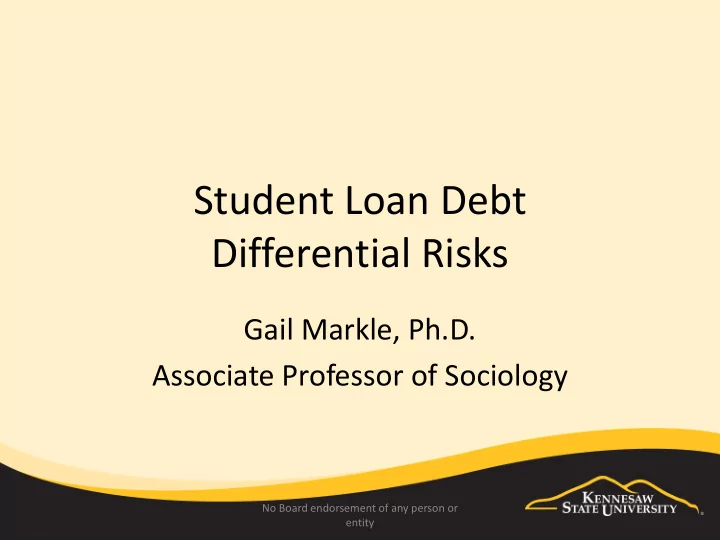

Student Loan Debt Differential Risks Gail Markle, Ph.D. Associate Professor of Sociology No Board endorsement of any person or entity
Student Borrowing over Time Amount Borrowed Anuually (Billions) in 2015 Dollars $140.0 $120.0 $100.0 $80.0 $60.0 $40.0 $20.0 $0.0 1995 2000 2005 2010 2015 Source: National Postsecondary Student Aid Study (NCES 2015). No Board endorsement of any person or entity
Class of 2015: 70.9% Borrowed an Average of $35,051 Student Loan Debt at Graduation $40,000 80.0% $35,000 70.0% $30,000 60.0% $25,000 50.0% $20,000 40.0% $15,000 30.0% $10,000 20.0% $5,000 10.0% $0 0.0% 1993 1995 2000 2005 2010 2015 Average Student Debt Percent Graduating with Loans Source: National Postsecondary Student Aid Study (NCES 2015) No Board endorsement of any person or entity
Increasing Costs of College Tution and Fees in 2016 Dollars $40,000 $35,000 $30,000 $25,000 $20,000 $15,000 $10,000 $5,000 $0 1976-77 1981-82 1986-87 1991-92 1996-97 2001-02 2006-07 2011-12 2016-17 Public Two Year Public Four Year Private Non Profit Four Year Source: National Postsecondary Student Aid Study (NCES 2015) No Board endorsement of any person or entity
Increasing Costs of College Tuition, Fees, Room and Board in 2016 Dollars $50,000 $45,000 $40,000 $35,000 $30,000 $25,000 $20,000 $15,000 $10,000 $5,000 $0 1976-77 1981-82 1986-87 1991-92 1996-97 2001-02 2006-07 2011-12 2016-17 Public Four Year Private Non Profit Four Year Source: National Postsecondary Student Aid Study (NCES 2015) No Board endorsement of any person or entity
Increasing Enrollment Enrollment (Millions) 25,000.0 20,000.0 15,000.0 10,000.0 5,000.0 0.0 1970 1975 1980 1985 1990 1995 2000 2005 2010 2015 2020 Source: National Postsecondary Student Aid Study (NCES 2015) No Board endorsement of any person or entity
Changing Enrollment Demographics • Minority students 44% • Nontraditional students 31% • First-generation students 32% No Board endorsement of any person or entity
Changing Enrollment Distribution of Enrollment by Race 0.9 0.8 0.7 0.6 0.5 0.4 0.3 0.2 0.1 0 1976 1980 1990 2000 2010 2014 White Black Hispanic Asian/PI Source: National Postsecondary Student Aid Study (NCES 2015) No Board endorsement of any person or entity
Study Sample N= 507 Total Expected Debt - Sample None 34.9% 55% Women, 45% Men < $10,000 4.8% $10,001- $20,000 10.1% $20,001- $30,000 19.7% 62% White, 20% Black, $30,001- $40,000 12.6% $40,001- $50,000 7.7% 8% Hispanic, 10% Asian $50,001- $60,000 4.8% $60,001 + 5.4% and Other 100.0% No Board endorsement of any person or entity
Debt Distribution Sample Compared to National Average 60.0% 50.0% 40.0% 30.0% 20.0% 10.0% 0.0% None < $30,000 >= 30,000 Sample Nationally No Board endorsement of any person or entity
Debt Distribution 120% 100% 80% 60% 40% 20% 0% White Black Hispanic Asian None < $30,000 >= 30,000 Source: Baum and Steele, 2010. No Board endorsement of any person or entity
Loan Use and Degree Completion Loan and No Degree Loan and Degree Federal Loan Use 0.0% 10.0% 20.0% 30.0% 40.0% 50.0% 60.0% 70.0% 80.0% Black White Source: Jackson and Reynolds, 2013 No Board endorsement of any person or entity
From Whom Did You Receive Advice? 7% 9% Parent(s) 11% College Admissions No Advice 56% Online Sources Other 17% No Board endorsement of any person or entity
How did you decide how much to borrow? • Calculated estimate • As much as possible • “IDK” (parents) • Guessed No Board endorsement of any person or entity
McCabe and Jackson (2016) Pathways to Financing College • Parents with financial and cultural capital • Parents with limited financial and cultural capital - students on their own • Students partnered with parents and counselors No Board endorsement of any person or entity
How Long to Pay Off Loans? 15% 16% < 5 years 13% 6 - 10 years 11-15 years 16 - 20 years 30% 20+ years 26% No Board endorsement of any person or entity
How will student debt affect your lifestyle after graduation? • Minimal impact • Moderate impact • Significant impact No Board endorsement of any person or entity
Concern about Ability to Repay 2% 16% 26% Not at all concerned Not very concerned Concerned Very concerned Extremely concerned 32% 24% No Board endorsement of any person or entity
How do you feel about the amount of student loan debt incurred? • Overwhelmed, anxious, stressed, scared • Necessary evil, normal • “Could be worse” • Uninformed, “duped” • Positive No Board endorsement of any person or entity
What do you wish you had known before taking on student debt? • Interest accrual • Alternatives to loans • “How college financing works” No Board endorsement of any person or entity
Recommendations • Reduce costs of college attendance • Reduce costs of borrowing • Stress importance of early planning • Better inform students about costs of borrowing, alternatives to borrowing, and borrowing less • Increase persistence of students from vulnerable groups No Board endorsement of any person or entity
References Baum, Sandy, and Marie O’Malley. 2003. “College on Credit: How Borrowers Perceive their Education Debt.” Journal of Student Financial Aid 33(3): 7-19. Baum, Sandy, and Patricia Steele. 2010. Who Borrows Most? Bachelor’s Degree Recipients with High Levels of Student Debt . NY: The College Board. Jackson, Brandon A., and John R. Reynolds. 2013. “The Price of Opportunity: Race, Student Loan Debt, and College Achievement.” Sociological Inquiry 83(3): 335-368. McCabe, Janice, and Brandon A. Jackson. 2016. “Pathways to Financing College: Race and Class in Students’ Narratives of Paying for School.” Social Currents 3(4):367-385. National Center for Education Statistics (NCES). 2015. National Postsecondary Student Aid Study . Washington, D.C.: U.S. Government Printing Office. No Board endorsement of any person or entity
Recommend
More recommend